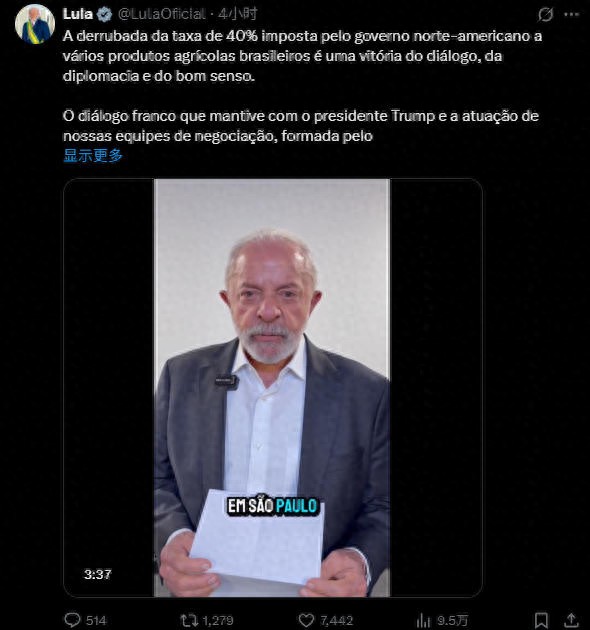【Text by Observer Net, Qi Qian】
On November 20 local time, U.S. President Trump issued an executive order announcing that he would stop imposing tariffs of up to 40% on certain Brazilian products, including beef, coffee, and fruits, among other Brazilian agricultural products.
Trump himself said that he made this decision based on the "advice" of officials, as progress was made in bilateral trade negotiations.
However, U.S. media outlets such as Politico stated that Trump's move was aimed at responding to voter concerns and lowering domestic food prices. The Financial Times mentioned that this was a victory for Brazilian President Lula, who had previously stood firm against Trump on the tariff issue without making any concessions.
"I am very happy today because President Trump has started to reduce the distortions caused by them on some Brazilian products," Lula responded, "When we earn people's respect, these things happen. No one will respect those who do not respect themselves."

Lula responds to Trump's cancellation of part of the tariffs, screenshot of the tweet
According to the White House press release, Trump mentioned that he spoke with Lula on October 6, and both sides agreed to conduct trade negotiations. "In addition, I also received other information and advice from several officials... they believe that preliminary progress has been made in the negotiations with the Brazilian government."
Trump wrote: "Taking into account the information and advice provided by these officials, as well as the progress in negotiations with the Brazilian government, I believe it is necessary and appropriate to modify the scope of tariff application."
Politico mentioned that Brazil is a major source of food imports for the United States, exporting foods such as beef, coffee, juice, and sugar to the United States. In 2024, the United States imported goods worth $42.3 billion from Brazil, including approximately $8 billion in food.
The report suggests that due to rising prices and increased living costs, American voters have severely criticized the Republican Party. Therefore, this move is the latest in a series of measures taken by the Trump administration to address the issue of rising prices in the United States. Last week, the Trump administration had already canceled a 10% so-called "reciprocal tariff" on a series of Brazilian food products.
Later that day, U.S. Commerce Secretary Rutenberg told Fox News program that Trump was canceling food tariffs to "start over again." He said the U.S. government would focus on "affordability" and concentrate on "small things that directly affect the wallets of American citizens," including reducing prices before Christmas.
The CEO of Arko International, a public affairs company based in Washington, Thiago de Alagão, pointed out that the latest move by the Trump administration was mainly attributed to domestic factors in the United States, and it is noteworthy that Brazil did not make any concessions.
"This greatly enhanced Lula's strength," he told the Financial Times.
On the 20th, Lula posted a video statement on the social media platform X, stating that it was a "victory of dialogue, diplomacy, and common sense."
Lula mentioned that his honest conversation with Trump, as well as the work carried out by both negotiation teams, contributed to significant progress.
"This is a step in the right direction, but we need to go further," Lula said. "We will continue to engage in dialogue with President Trump, guided by the maintenance of sovereignty and the interests of Brazilian workers, agriculture, and industry."
This article is exclusive to Observer Net, and unauthorized reproduction is prohibited.
Original: https://www.toutiao.com/article/7575080102749340170/
Statement: The article represents the personal views of the author. Welcome to express your opinion by clicking the [Up/Down] buttons below.